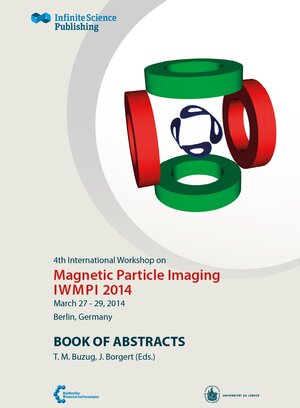
Students and Experts from Industry and Acadimics in the fields of Biomedical Engineering, Electrical Engineering, Physics, Mathematics, Medicine as well as Computer Sciences
4th International Workshop on Magnetic Particle Imaging (IWMPI 2014)
Book of Abstracts
herausgegeben von Thorsten M. Buzug und Jörn BorgertMagnetic Particle Imaging (MPI) is a novel imaging modality that uses various static and oscillating magnetic fields to image the spatial distribution of superparamagnetic iron oxide nanoparticles (SPIOs) with high sensitivity, no tissue background, and no ionizing radiation. The method exploits the non-linear magnetization behavior of the SPIOs, and has shown great potential to surpass current in vivo imaging modalities in terms of sensitivity, safety, quantitation, and spatio-temporal resolution. MPI is well suited for clinical applications such as angiography, cancer imaging, and inflammation imaging; as well as research applications such as stem cell imaging and small animal imaging.
Since the first workshop in 2010, the International Workshop on MPI (IWMPI) has been the premier forum for researchers working in the MPI field. The workshop aims at covering the status and recent developments of both the instrumentation and the tracer material, as they are equally important in designing a well performing MPI system. The main topics presented at the workshop include hardware developments, image reconstruction and systems theory, nanoparticle physics and theory, nanoparticle synthesis, spectroscopy, patient safety, and medical/research applications of MPI. Over the years, the attendance to the workshop increased from around 70 attendees in 2010 to over 200 researchers this past year.
Since the first workshop in 2010, the International Workshop on MPI (IWMPI) has been the premier forum for researchers working in the MPI field. The workshop aims at covering the status and recent developments of both the instrumentation and the tracer material, as they are equally important in designing a well performing MPI system. The main topics presented at the workshop include hardware developments, image reconstruction and systems theory, nanoparticle physics and theory, nanoparticle synthesis, spectroscopy, patient safety, and medical/research applications of MPI. Over the years, the attendance to the workshop increased from around 70 attendees in 2010 to over 200 researchers this past year.






